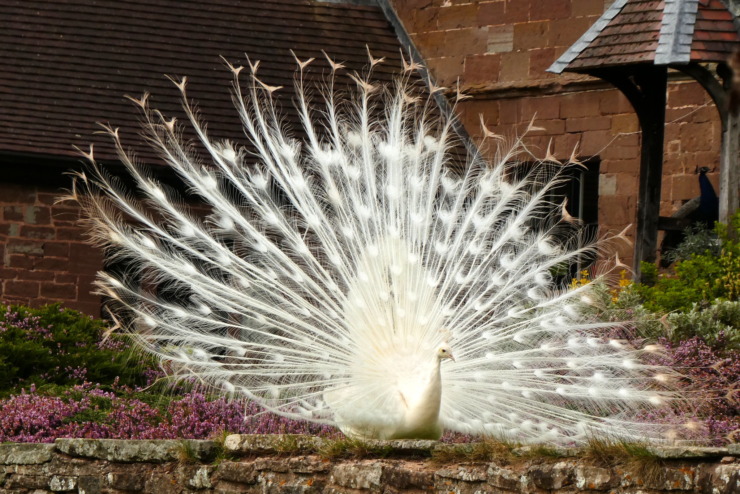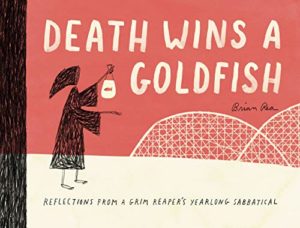Reading Death Wins a Goldfish
As the country opens up and we leave our Covid-induced cocoons, we are slowly getting our bearings. I recently attended a small outdoor spring wedding, and every one of us was so happy to be doing something we used to take for granted. As Katherine Anne Porter writes in Pale Horse, Pale Rider, set amid an earlier pandemic, “Now there would be time for everything.”
We have time. What is our everything? Friends, we have a tutor: Death, from Brian Rea’s Death Wins a Goldfish. The subtitle explains the premise: “Reflections from a Grim Reaper’s Yearlong Sabbatical.”
Fundamentally, it’s a book about life.
I picked it up after interviewing Houston Hughes for Children’s Book Club’s Hello Numbers!, which was illustrated by Brian Rea, who authored and illustrated this book. It came into my library during a personal sabbatical — a month, rather than a year. A month wasn’t hard to fill with my own wishes and dreams, but a whole year? What would I do with an entire year off?
Death makes a list. It’s arranged like a mind map and includes everything from “Work on a nickname” to “Win a prize.” And win a prize Death does — a goldfish, obtained at a carnival (which was also on the list). The goldfish bowl then accompanies Death on its adventures: hoverboarding, grocery shopping, lazing about in July. When the sabbatical ends, the goldfish moves into Death’s cubicle, along with a new collection of snow globes.
My copy of this book is labeled YA, but that label doesn’t really fit, unless we count a couple of Death’s ill-advised experiments with fellow college students. But to call it an adult book sounds too stuffy. Its categorization approaches the label proposed for a picture book in the movie Elf — “existential, yet accessible.” It’s also very funny. Sometimes the joke is in the illustrations, like when Death orders coffee and the barista writes “Beth” on the cup.
I liked that Death doesn’t have a giant revelation, just a sense of difference after the year ends. The benefit of the sabbatical come in the quiet moments — walking along a snowy ridge, standing inside a redwood tree, lying under May trees: “It’s the wind that makes the trees talk. You just have to be listening.” I also found my best moments of the pandemic were spent outside. During my month off I’ve been watching the pink roses come out and the cherry tomatoes turn red.
Recently poet and author Kwame Alexander wrote a poem compiled from NPR audience responses to an invitation to write a poem about life during and after the pandemic using Maya Angelou’s Still I Rise. Alexander’s poem is titled I Wake With Wonder, and it sounds like something Death might have journaled, post-goldfish.
Birds tweeting, wind blowing, leaves rustling. I notice it all now.
I like this new world.
The pandemic has lasted long enough for us to make changes to our routines, then grow bored with them, then embrace them anew. Even without actual time off from our human resources departments, we can still be generous toward ourselves as we emerge from isolation. Maybe we need to check grand things off a bucket list, like travel to Paris. Or maybe we can get a lot out of accomplishing smaller goals: “Buy new towels.”
P.S. I did that one. They bring me great joy.
May’s Pages
Poetry
Poetry 180, edited by Billy Collins (a book which belonged to a poet friend of mine who recently passed away)
No Limits but Light, by Lianne Mercer
Picture Books and Early Readers
Three Wishes, by Lucille Clifton, illus. Michael Hays
Miss Spider’s Tea Party, by David Kirk
Fables, by Arnold Lobel
Owl at Home, by Arnold Lobel
Middle Grade and YA
Aristotle and Dante Discover the Secrets of the Universe, by Benjamin Alire Sáenz (Join us for a high school-themed Children’s Book Club next Friday, June 11!)
The King of Attolia (book 3), by Megan Whalen Turner
A Conspiracy of Kings (book 4), by Megan Whalen Turner
Thick as Thieves (book 5), by Megan Whalen Turner
Grownups
Hiding in Plain Sight: Lady Bird Johnson, by Julia Sweig
Made Progress
Return of the Thief (book 6), by Megan Whalen Turner
For Discussion
1. What is a book that surprised you, as this one did me?
2. What is something on your post-pandemic list?
3. Share your May pages. Sliced, started, and abandoned are all fair game.
Photo by Mike Finn, Creative Commons, via Flickr. Post by Megan Willome.
Browse more Reading Generously
I loved this book. As soon as I finished, I began reading it again.”
—David Lee Garrison, author of Playing Bach in the D. C. Metro
- Perspective: The Two, The Only: Calvin and Hobbes - December 16, 2022
- Children’s Book Club: A Very Haunted Christmas - December 9, 2022
- By Heart: ‘The night is darkening round me’ by Emily Brontë - December 2, 2022



Glynn says
On my post-pandemic list: Philip Roth: The Biography by Blake Hailey (I couldn’t resist the cancellation controversy over Hailey, so I bought the Norton edition before they halted publication), Far From the Madding Crowd by Thomas Hardy, and Book 2 of Between Two Millstones, Aleksandr Solzhenitsyn’s literary memoir.
September Reading:
Mystery
A Fatal Obsession by Faith Martin
A Patient Man by Charlie Garratt
The Grave Tattoo by Val McDermid
Phantom Echo by Eldon Farrell
Death Among the Nightingales by David Field
Salt in the Wounds by Mark Richards
Non-fiction
Inside the Nazi Ring by H.M. Denham
How to Write a Form Poem by Tania Runyan
Tolkien’s Modern Reading by Holly Ordway
Shakespeare Reading Project
The Rape of Lucrece
The Sonnets (all 154 of them)
Othello
Love’s Labour’s Lost
Poetry
Dense Poems & Socratic Light: The Poetry of John Martin Finlay
Joe Dimaggio Moves Like Liquid Light by Loren Broaddus
Unpaused Poems by Alice Scott-Ferguson
Love in the Time of Coronavirus by Angela Alaimo O’Donnell
Fiction
The Garden House by Linda Mahkovec
At the End of the Matinee by Keiichiro Hirano
Cane by Jean Toomer
Invisible Ink by Patrick Modiano
Megan Willome says
Thanks for your list, Glynn.
I found a Twitter thread in which people described the past year using a book title: “Far from the Madding Crowd” came up a few times.
Glynn says
My own reason is that I recently saw the movie with Carey Mulligan.
Will Willingham says
So, I just read Death Wins a Goldfish over breakfast and it is absolutely delightful. I’m with you on whether it’s YA or not. I could see enjoying this book as a 3rd grader. I wouldn’t have gotten all the jokes, sure. But I would have enjoyed it. And I would have enjoyed it when I hit the age-appropriate YA age. And I thoroughly enjoyed it as a grownup.
It was fitting to read this weekend, as it was the first time since Christmas (with the exception of one weekend when I had family here and I didn’t work the *entire* time) that I haven’t worked 7 days a week. I’m not actually proud of that, but so it is. I felt a little like Death wandering around trying to figure out what to do with myself, especially when it does still feel a little awkward to be out and about in the world.
But I went to the farmers market and bought sorrel and mandazi and a ginger lime kombucha. I spent some time wandering around a nursery. I walked downtown. I walked in my neighborhood. I felt some of the same wonder and strangeness that Death seemed to experience outside of their cubicle.
Also? I laughed out loud at “Beth.” The book has some of those moments. They are clever and they are perfect.
Thanks for sharing this one, Megan.
Megan Willome says
Will, I thought you might enjoy this one! Although I’m sorry to hear your recent day off was your first in a while, I am glad you found ways to spend it that fed your soul. The farmers market and kombucha are always winners, in my book.